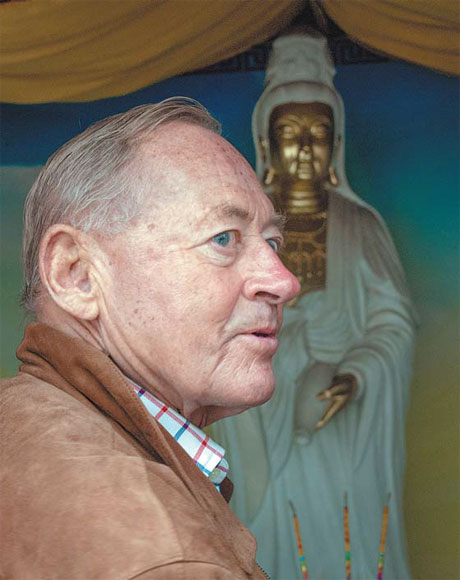Leap of faith
Updated: 2015-03-13 08:12
(China Daily Europe)
|
|||||||||||
Book Review | Martin Palmer
How one man embraced taoism in his journey from commerce to conservation
Sacred Mountains by Allerd Stikker, Bene Factum Press, London 2014ISBN 978-1-909657-56-4
In the late 1970s and early 1980s, Allerd Stikker, head of a Dutch ship building company, was busy exporting armaments abroad. By 2013, he turned into a man selling arms of a different kind for a more pressing war: ecological conservation. His journey, from businessman to advocate of ancient Taoism as green weaponry, forms the heart of this extraordinary book.
It was in Taiwan in the early 1980s that Stikker saw the damage inflicted on the natural environment and, at his suggestion, a group of scholars and scientists produced the first critical review of the island's environment as an attempt to raise awareness in its authorities and among its people.
While working on this he encountered Taoism and was deeply moved by its vision as illustrated in chapter 29 of the Dao De Jing: "The earth is a sacred vessel and it cannot be owned or improved. If you try to possess it, you will destroy it. If you try to hold on to it you will lose it."
However, in 1981 nobody in Taiwan, nor I suspect in the Chinese mainland, was interested in what Taoism had to say about our relationship with nature.
It took a major personal crisis for Stikker to leave the world of business and start his own odyssey exploring the relationship between belief, nature, philosophy and ecology. Greatly influenced both by Taoist philosophy and the radical Christianity of Teilhard de Chardin, a Jesuit who had worked in China in the early 1920s, Stikker entered the world of ideas, writing books and articles and then founding the Ecological Management Foundation. The foundation sought to bring together worlds barely knew the other existed business and ecology, spirituality and science, in the hope that the blinkered way most of us view the world around us might be expanded and, in being expanded, be capable of being changed for the better.
From the intellectual adventure he undertook in the 1990s, he moves into action in China at the start of the 21st century, working with major Taoist sacred sites and traditions across China, partnering with my own organization the Alliance of Religions and Conservation, founded by the Duke of Edingburgh in 1995, and eventually helping to create the first eco-temple in China, a story which takes an astonishingly personal twist that the book relates.
However, this book is not just a personal story. It is a fascinating introduction to Taoism, to the goddess Guan Yin and her role in Stikker's life. This book is also about how Stikker has watched China's political leadership move to engage with ancient traditions such as Taoism and Confucianism. It is a guide to the key elements in Taoist thought that have led the Taoists of China to be hailed as one of the most radical ecological faiths anywhere.
If you thought you knew about ecology in China, if you thought you knew about religion in China and if you thought you knew what the future might look like this book will challenge you, enthrall you and leave you at the end with a profoundly different view of the world and its possible future.
Beautifully illustrated, rich in details and information, this is a book to inspire as well as inform.
Martin Palmer's translations of I Ching (I Jing), Chuang Tzu (Zhuang Zi) and Guan Yin were published recently, as was his translation of Shangshu for Penguin Classics.
|
Allerd Stikker, author of Sacred Mountains, an introduction to Taoism, to the goddess Guan Yin and her role in Stikker's life. Provided to China Daily |
(China Daily European Weekly 03/13/2015 page28)
Today's Top News
China likely to ease again if inflation falls: insider
Reproach for wrongful convictions
China's two universities make top 50
Astronauts return from space station
Italian court upholds Berlusconi's acquittal
UK companies seek new opportunities in China
CNR, CSR merger passes overseas antitrust scrutiny
Official urges Dalai Lama to forsake evil ways
Hot Topics
Lunar probe , China growth forecasts, Emission rules get tougher, China seen through 'colored lens', International board,
Editor's Picks

|

|

|

|

|

|






